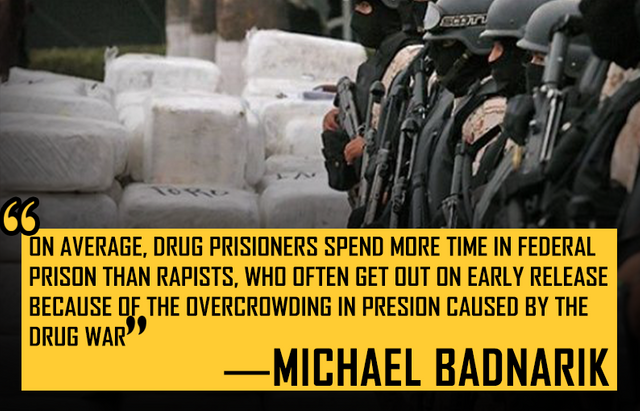War on drugs? or war on people?

The U.S. State Department in its report on the "International Narcotics Control Strategy 2016," has pointed out that many Latin-American countries are of transit of chemical precursors, processing of illegal narcotics and vulnerable to transnational organized crime, among other aspects; insinuating that we are not capable of carrying out an autonomous strategy - that is, without them - to confront the phenomenon of drug trafficking.
The US, with its attitude as the world's police force, tends to issue reports with a geopolitical key and a certain interference intent and generally tries to tarnish the image of countries whose international policy is not to its liking. But history already records a number of facts that demonstrate the hypocrisy of its so-called'war on drugs'.

Most Latin-American countries are one of the countries that have experienced firsthand the wave of violence of the war on drugs. Source
Prohibitionism and the all-out war on drugs, promoted for several decades by the United States, have had different effects than those sought after. Yet criminal organizations continue to grow richer and richer as violence increases in all the countries where the drug, particularly cocaine, is produced or trafficked to the main country of consumption, the United States. Grey areas multiply within structurally weak and corrupt states, and also within strong states. Corruption is on the rise, driven in part by the hundreds of billions of dollars generated annually by drug trafficking; murders are rising dramatically in Central America, Mexico and the Caribbean.
The homicide rates in some countries like Honduras are alarming: 59 murders per 100,000 inhabitants. In the city of Ceiba, that number rises to 174.2 deaths per 100,000 inhabitants. This is more than 10 times the average number of murders in the Americas (16/100,000), and 25 times the world average (6.9/100,000)*.
In Honduras, homicides increased by 100% between 2005 and 2010. In Mexico, 65%. In both cases, the killings were concentrated in the north, in areas through which the drug travels. On the other hand, in Jamaica, 60% of the approximately 1,500 homicides per year are linked to drug trafficking. 65% in Trinidad and Tobago (Dialogue 2010).
In South America, drug trafficking has financed insurgent groups, counterinsurgents, terrorists and, indeed, corrupt politicians. It provided (and continues to provide) direct or indirect support for the violence that has resulted in tens of thousands of deaths in Peru and Colombia in past decades. Both countries are coincidentally the world's leading cocaine producers.
The effort to reduce cocaine production in Colombia - the main producer until 2010 - resulted in increased production in Peru, which surpassed Colombia in pure cocaine. In addition, while hectares under coca cultivation have been declining in Colombia, they have increased in Peru and Bolivia. This phenomenon is popularly known as the balloon effect: if you press one point the problem arises in another.
All this shows that the war on drugs has not only failed: it has also been and continues to be counterproductive. The collateral damage is enormous; far greater than any benefit that can be wielded by those who defend it. The prohibitionist logic has filled the world's prisons with micro-traffickers and consumers, at a very high monetary cost to the States. The criminalization of drug use prevents drug addiction - and its impact on society - from being addressed for what it is: a disease and a public health problem.
The enormous profits generated by drug trafficking - which are partly explained by the high prices brought about by the war on drugs - contribute to the proliferation of grey areas around the world, erode institutions and weaken democracy. In some countries the result has been a vicious cycle of corruption-illegality-violence-corruption from which it is very difficult to escape.
Drug prohibition is an inherently violent and ruthless policy against individuals who are free to choose what they want to do with their bodies, it ends up affecting the people and only the people due to government control, it's the people that give power to the states and governments based on the idea that the government will solve all their problem. As previously stated we have seen that the war on drugs is just another failure of the U.S tendency to be the police of the world. Drug on war will forever remain a failure because, in simple words, it violates the human freedom of choosing.

Source
There's nothing moral on the drug on wars, one must believe that drugs are bad for people but so is the alcohol, unhealthy food and no one is carrying out a war on those. It's the hypocrisy of the government of affirming that we live in a free society but we are not able to make free choices such as consuming drugs. All addictions are bad but you don't see any police office arresting Gamers, food lovers, or any kind of addicted because it actually has negative effects not only in their bodies but in their mental health.
War on the drug has shown that the government inefficiency in solving problems, everytime that the goverments makes an intervention it end up making the problem worse, so it was when they tried to regulate the alcohol back in the 20th century. It wasn't until Portugal's government decided to legalize marijuana until the use of marijuana and the war to fight against it decreased, why? because humans have a tendency for prohibitions because of our inherent sense of freedom and the pursuit of happiness.
Don't misunderstand me, there are people who commit illegal acts under the influence of drugs, and just as alcoholics should both be penalized. But attacking the individual freedom of citizens just beacuse a minority commiting crimes under their effects will never solve the problems. If you ask anybody on the street they will always say that they own their own bodies, according to the goverments logic when it comes to drugs you dont even own your own body, the goverment does.
In this article is stated:
Drug prohibition is the attempt to do the impossible through the mechanism of violence. Drug prohibition is The attempt to quell the vices passions of man do the iron fist of the state. The Tyranny of the drug war has Ruined millions of lives, torn apart families, destroyed communities, built the largest prison population in human history, and in the process, cost taxpayers billions.
and:
What if they started arresting McDonald’s employees for distributing unhealthy food and locking them in human cages for decades on end and claiming it was for the betterment of society. Would this be morally acceptable? Only if carried out by the state Because it’s okay for only it’s employees to use violence I guess.
People must stop believing that use of force when carried out by the state is absolutely any different than when carried out by private individuals or groups. The drug war is just one area, be it a large one, that this problem plagues the opinions of the population.
Some questions that we must face about the drug on war, is it really fair? are we really trying to help people, when it violates their rights of free choice and it affects the people? what happened with the corruption?


Thanks for reading!
© 2018 All rights reserved. steemit.com/@blackliberal | Terms & Conditions of Use | Privacy Policy

so agree. In countries where drugs have been legalized and the stigma and criminalization have been removed, way fewer people die of drug overdoses and become addicted. Plus, the jails aren't full of people there for drug use.
Hey, @blackliberal. I am a curator of the Whaleshares Curation Team. I have selected your post to be presented in a live curation discussion on Monday 18th June. Your post will be awarded a Whaleshares vote on the night. I do hope you can come along and spectate. The event will be held in The Curation Lounge on the Whaleshares server. Here's a link to the last week's show: https://steemit.com/competition/@nikflossus/the-31st-whaleshares-curation-show-let-s-talk-about-project-giving
I'd love to have you on my @msp-waves show to talk about this.
Curated for #informationwar (by @wakeupnd)
Relevance: Sharing the truth.
Our purpose is to encourage posts discussing Information War, Propaganda, Disinformation and other false narratives. We currently have over 7,500 Steem Power and 20+ people following the curation trail to support our mission.
Join our discord and chat with 150+ fellow Informationwar Activists.
Connect with fellow Informationwar writers in our Roll Call! InformationWar - Contributing Writers/Supporters: Roll Call Pt 8
Ways you can help the @informationwar